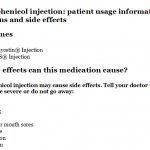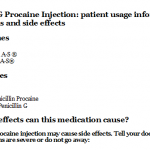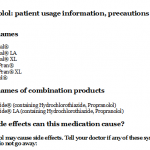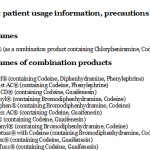
Gentamicin Injection: patient usage information, precautions and side effects
Tuesday, May 30, 2017 by Gregory Van Dyke
http://www.naturalnewsreference.com/2017-05-30-gentamicin-injection-patient-usage-information-precautions-and-side-effects.html
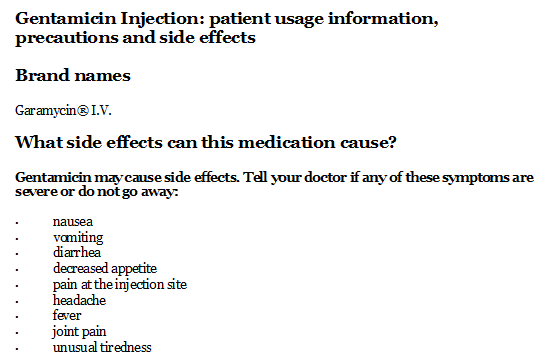
Gentamicin Injection: patient usage information, precautions and side effects
Brand names
Garamycin® I.V.
What side effects can this medication cause?
Gentamicin may cause side effects. Tell your doctor if any of these symptoms are severe or do not go away:
-
nausea
-
vomiting
-
diarrhea
-
decreased appetite
-
pain at the injection site
-
headache
-
fever
-
joint pain
-
unusual tiredness
Some side effects can be serious. If you experience any of these symptoms or those listed in the IMPORTANT WARNING section, call your doctor immediately or get emergency medical treatment:
-
rash
-
peeling or blistering of the skin
-
itching
-
hives
-
swelling of the eyes, face, throat, tongue, or lips
-
difficulty breathing or swallowing
-
hoarseness
Gentamicin may cause other side effects. Call your doctor if you have any unusual problems while using this medication.
If you experience a serious side effect, you or your doctor may send a report to the Food and Drug Administration’s (FDA) MedWatch Adverse Event Reporting program online (http://www.fda.gov/Safety/MedWatch) or by phone (1-800-332-1088).
IMPORTANT WARNING:
Gentamicin may cause serious kidney problems. Kidney problems may occur more often in older people or in people that are dehydrated. Tell your doctor if you have or have ever had kidney disease. If you experience any of the following symptoms, call your doctor immediately: decreased urination; swelling of the face, arms, hands, feet, ankles, or lower legs; or unusual tiredness or weakness.
Gentamicin may cause serious hearing problems. Hearing problems may occur more often in older people. Hearing loss may be permanent in some cases. Tell your doctor if you have or have ever had dizziness, vertigo, hearing loss, or ringing in the ears. If you experience any of the following symptoms, call your doctor immediately: hearing loss, roaring or ringing in the ears, or dizziness.
Gentamicin may cause nerve problems. Tell your doctor if you have or have ever had burning or tingling in the hands, arms, feet, or legs; muscle twitching or weakness; or seizures.
The risk that you will develop serious kidney, hearing, or other problems is greater if you are taking certain prescription or nonprescription medications. Tell your doctor and pharmacist if you are taking acyclovir (Zovirax, Sitavig); amphotericin (Abelcet, Ambisome, Amphotec); capreomycin (Capastat); certain cephalosporin antibiotics such as cefazolin (Ancef, Kefzol), cefixime (Suprax), or cephalexin (Keflex); cisplatin; colistin (Coly-Mycin S); cyclosporine (Gengraf, Neoral, Restasis, Sandimmune); diuretics (‘water pills’) such as bumetanide, ethacrynic acid (Edecrin), furosemide (Lasix), or torsemide (Demadex). other aminoglycoside antibiotics such as amikacin, kanamycin, neomycin (Neo-Fradin), paromomycin, streptomycin, and tobramycin; polymyxin B; or vancomycin (Vanocin). Your doctor may not want you to receive gentamicin injection.
Tell your doctor if you are pregnant or plan to become pregnant. If you become pregnant while using gentamicin injection, call your doctor immediately. Gentamicin may harm the fetus.
Keep all appointments with your doctor and the laboratory. Your doctor will order certain tests, including hearing tests, before and during treatment to check your body’s response to gentamicin.
Why is this medication prescribed?
Gentamicin injection is used to treat certain serious infections that are caused by bacteria such as meningitis (infection of the membranes that surround the brain and spinal cord) and infections of the blood, abdomen (stomach area), lungs, skin, bones, joints, and urinary tract. Gentamicin injection is in a class of medications called aminoglycoside antibiotics. It works by killing bacteria.
Antibiotics such as gentamicin injection will not work for colds, flu, or other viral infections. Taking antibiotics when they are not needed increases your risk of getting an infection later that resists antibiotic treatment.
How should this medicine be used?
Gentamicin injection comes as a liquid to be injected intravenously (into a vein) or intramuscularly (into a muscle). When gentamicin is injected intravenously, it is usually infused (injected slowly) over a period of 30 minutes to 2 hours once every 6 or 8 hours. The length of your treatment depends on the type of infection you have.
You may receive gentamicin injection in a hospital or you may administer the medication at home. If you will be receiving gentamicin injection at home, your healthcare provider will show you how to use the medication. Be sure that you understand these directions, and ask your healthcare provider if you have any questions.
You should begin to feel better during the first few days of treatment with gentamicin injection. If your symptoms do not improve or get worse, call your doctor.
Use gentamicin injection until you finish the prescription, even if you feel better. If you stop using gentamicin injection too soon or skip doses, your infection may not be completely treated and the bacteria may become resistant to antibiotics.
Ask your pharmacist or doctor for a copy of the manufacturer’s information for the patient.
Other uses for this medicine
Gentamicin is also sometimes used to treat pelvic inflammatory disease, granuloma inguinale (donovanosis; a sexually transmitted disease), and other serious infections such as the plague and tularemia. Talk to your doctor about the risks of using this medication for your condition.
This medication may be prescribed for other uses; ask your doctor or pharmacist for more information.
What special precautions should I follow?
Before using gentamicin injection,
-
tell your doctor and pharmacist if you are allergic to gentamicin injection; other aminoglycoside antibiotics such as amikacin, kanamycin, neomycin, paromomycin, streptomycin, or tobramycin; sulfites; any other medications; or any of the ingredients in gentamicin injection. Ask your pharmacist for a list of the ingredients.
-
tell your doctor and pharmacist what other prescription and nonprescription medications, vitamins, and nutritional supplements, you are taking or plan to take. Be sure to mention the medications listed in the IMPORTANT WARNING section and any of the following: other antibiotics such as amoxicillin (Amoxil, Larotid, Moxatag, in Augmentin, in Prevpac), ampicillin, or penicillin; dimenhydrate (Dramamine); meclizine (Bonine); or nonsteroidal anti-inflammatory drugs such as indomethacin (Indocin, Tivorbex). Your doctor may need to change the doses of your medications or monitor you carefully for side effects. Many other medications may also interact with gentamicin, so be sure to tell your doctor about all the medications you are taking, even those that do not appear on this list.
-
tell your doctor if you are or have or have ever had cystic fibrosis (an inherited condition that affects the lungs and digestive system), problems with your muscles such as myasthenia gravis or Parkinson’s disease.
-
if you are having surgery, including dental surgery, tell the doctor or dentist that you are using gentamicin injection.
What special dietary instructions should I follow?
Unless your doctor tells you otherwise, continue your normal diet.
In case of emergency/overdose
In case of overdose, call your local poison control center at 1-800-222-1222. If the victim has collapsed or is not breathing, call local emergency services at 911.
What other information should I know?
It is important for you to keep a written list of all of the prescription and nonprescription (over-the-counter) medicines you are taking, as well as any products such as vitamins, minerals, or other dietary supplements. You should bring this list with you each time you visit a doctor or if you are admitted to a hospital. It is also important information to carry with you in case of emergencies.
Why is this medication prescribed?
How should this medicine be used?
What special precautions should I follow?
What special dietary instructions should I follow?
What side effects can this medication cause?
Tagged Under: Tags: chemical medicine, medication, Pharma, Prescription Medicine

